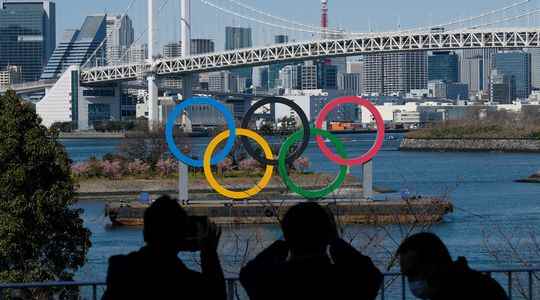“Use the money for the coronavirus, not for the Games!” chanted at the end of November by members of Hangorin no kai (Association against the Olympics), gathered in front of the Tokyo town hall. Their leader, the artist Misako Ichimura, short hair and round glasses, apostrophized Thomas Bach, president of the International Olympic Committee (IOC), at the entrance of the futuristic cathedral-like building, shouting his rejection of a “show” motivated by powerful interests, “which many around the world believe is impossible to organize because of the pandemic”.
Far from being a marginal phenomenon, the anger of this activist reflects the concern of many Japanese about the maintenance of the event, next July, in a country facing a third wave of coronavirus contaminations (more than 7000 new daily cases, five times more than in November). A survey by the public broadcaster NHK carried out in December revealed that 63% of the population wanted the report, even the cancellation of the Olympics, while the competition has already been postponed for a year. “People have lost their illusions about the promises of the prospects offered by this meeting,” judge Hiroki Ogasawara, a sociologist from Kobe University.
Decision-makers are stepping up efforts to reassure residents and champions. While the IOC would reflect, according to the British daily The Guardian, to obtain priority vaccination for the athletes, the organizing committee has introduced strict prevention measures – installation of a test center in the Olympic village, temperature checks at the entrance to the venues, screening every four or five days for athletes – during competitions that will host 11,000 Olympic athletes, 4,400 Paralympians and almost 90,000 volunteers. The decision whether or not to accept from the public will be made in the spring.
For the government, a symbol of reconquest and national pride
Showing its confidence, the committee is maintaining the start of the Olympic torch route for March 25 and the calendar of qualifying events, starting with synchronized swimming on March 4. For his part, the new Japanese Prime Minister, Yoshihide Suga, hammered home during his New Year’s greetings his determination to meet the deadlines to prove “victory against the virus”. This voluntarism sometimes borders on the Coué method. “Worried? Not at all”, replied on January 7 the president of the organizing committee, Yoshiro Mori, to a question on the holding of the Games despite the pandemic, while the IOC presents them as the “light at the end of the tunnel”. .
But the procrastination of the head of government did not help to dispel the doubts. He took office in September 2020 and waited until January 7 to declare a new state of emergency. And again: no containment is planned, and the measure only concerns Tokyo and the neighboring departments. Nothing says that it will be enough, especially since vaccinations should not start before the end of February.
These measures considered late, even light, taken by a surprised Prime Minister at the end of December in a famous “Steak house” in the chic district of Ginza when he called on the Japanese to limit outings – which is worth to him today the nickname of Steak Shusho (“the Prime Minister steak”) -, add to the alarming news arriving from Europe on the health level. And this, while the country currently displays a rather “flattering” balance sheet of 274,675 contaminations for 3,711 deaths as of January 8.
In the midst of an economic crisis, the Japanese are also struggling to digest the explosion of the bill for the Olympics: it has climbed to 15.4 billion dollars, against 7.3 billion promised at the time of the candidacy. Such a level of anxiety within a population that hates uncertainty allows rumors to swell at full speed. In October, the executive had to deny claims by writer Ryu Honma, a former publicist, that the IOC had decided to cancel the Olympics.
An unthinkable scenario for Tokyo, as for the IOC. Too much money invested by Japan and broadcasters around the world, eight venues built, including the new national stadium. Not to mention that the government has made the Olympics a symbol of reconquest and national pride. Tokyo has already experienced a cancellation – in 1940, because of the Second World War. This time, explains Robin Kielinski, a specialist in Japan at the University of New York, the government feels “an almost historic pressure so that everything goes well: the Games must benefit the country economically, but also demonstrate that the archipelago does not not stay in the shadow of a Chinese rival who is growing in power”.
